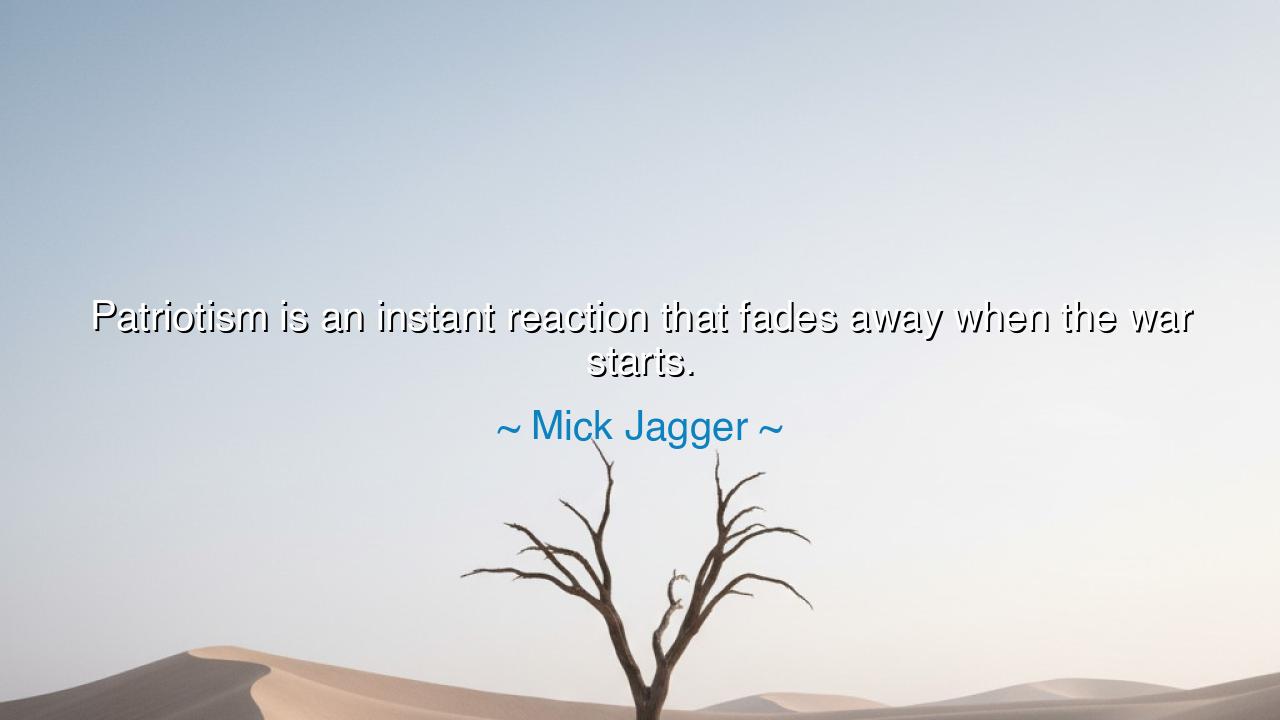
Patriotism is an instant reaction that fades away when the war






“Patriotism is an instant reaction that fades away when the war starts.” So declared Mick Jagger, the voice of a restless generation, whose words carry the weight of irony and bitter truth. In this saying, he unmasks a flaw that has haunted nations through the ages: that patriotism, so loudly proclaimed in times of peace, often withers when confronted with the fire, blood, and sacrifice of real war. For it is easy to shout love of country in the safety of festivals and parades, but it is another thing altogether to endure the darkness of conflict when the price of such love is measured in lives.
The meaning of this quote is a rebuke to shallow loyalty. Jagger speaks of the instant reaction—the swelling of emotion when flags wave, when songs are sung, when speeches rouse the crowd. In those moments, patriotism seems eternal, unshakable. Yet when war breaks forth, when the cannons roar and the summons to sacrifice is delivered, the multitudes grow quiet, the enthusiasm fades, and many retreat into fear or self-preservation. Thus, Jagger warns us: beware of patriotism that is only a spark, for it will vanish in the storm.
History confirms his words. At the dawn of the First World War, cities across Europe erupted with patriotic fervor. Crowds cheered, young men rushed to enlist, and flags filled the air. But as the war dragged on, as trenches swallowed lives and blood stained the fields of France, the initial fire dimmed. Enthusiasm gave way to despair, and patriotism, once shouted in joy, was whispered in mourning. The reaction was instant, but the endurance faded. True loyalty was proven not by those who cheered at the outset, but by those who bore the suffering without abandoning the cause.
The American Civil War also bears witness. In 1861, when the drums first sounded, both North and South swelled with volunteers. They believed the war would be short, glorious, and decisive. But as years passed, as brothers died and fields lay in ruin, the excitement waned. Only the deepest patriotism, rooted in conviction and principle, endured to the end. Here we see Jagger’s truth: the shallow patriotism of the instant cannot withstand the long and grinding weight of war.
Yet Jagger’s words also serve as a call to wisdom. They remind us that true patriotism must be more than reaction—it must be conviction. A nation cannot be defended by bursts of emotion alone, but by steady hearts, prepared to endure suffering and sacrifice. The patriot’s love is tested not in times of peace, but in the fire of war. Those who endure are the true patriots, while those who vanish were only carried away by the fleeting wind of enthusiasm.
The lesson to be passed down is this: let your love of country be deep, not shallow; steady, not instant. Do not wait until banners wave to proclaim it, nor let it fade when the call to sacrifice comes. True patriotism is not a passing feeling but a lifelong devotion, ready to serve in peace and in conflict, in prosperity and in hardship. It does not fade with the first sound of gunfire, but grows stronger in the midst of trial.
Practically, this means nurturing a patriotism rooted in duty and principle. Support your community not only in celebration but in times of need. Stand by your country when it stumbles, not only when it soars. Teach your children that love of homeland is not a festival to attend, but a responsibility to live. In this way, patriotism will not be an instant reaction, but an enduring flame.
Thus, let Jagger’s words stand as both warning and challenge: patriotism fades when it is only reaction. If it is to endure, it must be planted deep, watered by sacrifice, and tested by time. Then, and only then, will it stand unbroken, even when the storm of war rages without mercy.






AAdministratorAdministrator
Welcome, honored guests. Please leave a comment, we will respond soon